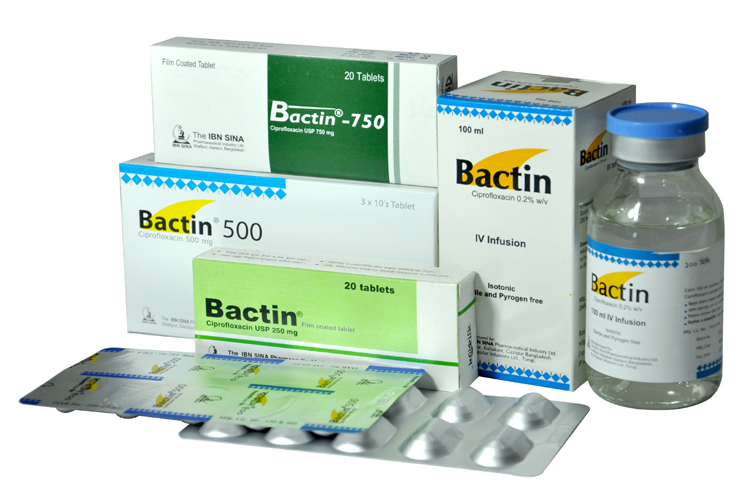
BACTIN
CIPROFLOXACIN HYDROCHLORIDE USP
| NAME | STRENGTH | PACK SIZE | DOSAGE FORM |
|---|---|---|---|
| BACTIN 200 MG/ 100 ML | 200 MG/ 100 ML | 100 ML | IV INFUSION |
| BACTIN 250 MG/5 ML | 250 MG/5 ML | 60 ML | POS |
| BACTIN 250 MG | 250 MG | 20 S | TABLET |
| BACTIN 500 MG | 500 MG | 30 S | TABLET |
| BACTIN 750 MG | 750 MG | 20 S | TABLET |
Bactin 250: Each tablet contains Ciprofloxacin 250 mg as Ciprofloxacin Hydrochloride USP. E2 Bactin 500: Each tablet contains Ciprolloxacin 500 mg as Ciprofloxacin Hydrochloride USP. Bactin 750: Each tablet contains Ciprolloxacin 750 mg as Ciprofloxacin Hydrochloride USP. Bactin POS:Each bottle contains powder for reconstitution of 60 ml suspension. Bactin IV Infusion: Each 100 ml solution contains Ciprofloxacin 200 mg as Ciprofloxacin Lactate USP.
Bactin (Ciprofloxacin) is a broad-spectrum synthetic quinolone antibacterial agent. It is active against most of the gram-negative aerobic bacteria like Enterobacteriaceas & Pseudomonas aeruginosa and gram-positive aerobic bacteria including penicillinase producing, penicillinase non-producing and Methicillin-resistant Staphylococci. The bactericidal action of Ciprofloxacin results from interfering with the enzyme DNA gyrase which are required for bacterial DNA replication, transcription, repair and recombination.
Bactin is indicated for the management of single or mixed infections caused by two or more susceptible microorganisms. It can also be used against infections caused by organisms resistant to other antibiotics. Bactin is indicated for the treatment of the following infections. Gastrointestinal tract infection: Typhoid fever and infected diarrhea. Urinary tract infection: Complicated and uncomplicated urethritis, cystitis, pyelonephritis, prostatitis and epididymitis. Respiratory tract infection: Pneumonia, acute and chronic bronchitis, cystic fibrosis, bronchiectasis and empyema. Skin and soft tissue infection: Wound infection, abscess, infected ulcer, cellulitis, infected burn, erysipelas and otitis externa. Severe systemic infection: Septicemia, bacteremia, infection in immunosuppressive patient with hematological or solid tumors. Biliary tract infection: Cholangitis, cholecystitis, empyema of the gall bladder. Eye, ear, nose and throat infection: Otitis media, sinusitis, mastoiditis and tonsillitis. Bone and joint infection: Osteomyelitis and arthritis. Pelvic infection: Salpingitis, endometritis and pelvic inflammatory diseases. Abdominal infection: Peritonitis & intraabdominal abscess. Gonorrhea: Urethral, rectal and pharyngeal gonorrhea caused by beta-lactamase producing organisms or organisms moderately sensitive to penicillin.
Adult: The usual adult dose is 250-750 mg 12 hourly. Usual dosage schedule -- Typhoid Fever: 500 mg 12 hourly 7-14 days. Infected Diarrhea: 500 mg 12 hourly 5-7 days. Chronic Salmonella Carriers: 500-750 mg 12 hourly 28 days. Complicated UTI: 500 mg 12 hourly 3-5 days. Uncomplicated UTI: 250 mg 12 hourly 3-5 days. Respiratory Tract Infection: 500-750 mg 12 hourly 7-14 days. Skin and Soft Tissue Infection: 500-750 mg 12 hourly 7-14 days. Uncomplicated Gonorrhea: 250 mg single dose. Wound Infection: 500 mg 12 hourly 7-14 days. Bone and Joint Infection: 500-750 mg 12 hourly 7-14days. Other Infection: 500-750 mg 12 hourly 7-14 days.
Ciprofloxacin is contraindicated in patients with a known history of hypersensitivity to it or any of its components and to other Quinolones.
Ciprofloxacin should be used with great caution in patient with a known history of epilepsy or other factors, which predispose to seizure and convulsion. Patients should be advised to take Ciprofloxacin two hours after meal. Patients should be advised not to take Antacid containing aluminum or magnesium concomitantly or within two hours after dosing and also requested to drink plenty of water.
Ciprofloxacin is generally well tolerated. Gastrointestinal disturbances like nausea, vomiting, diarrhea, dyspepsia and abdominal pain; CNS disturbances e.g. dizziness, drowsiness, headache, tiredness, confusion, convulsion, skin rashes, pruritus and possible systemic reactions may occur. It has also been reported that joint pain, mild photosensitivity may occur and liver enzyme, serum bilirubin, creatinine levels may increase slightly after administration. Risk of Retinal detachment may also occur.
Ciprofloxacin has been shown to cause arthropathy it immature annals and therefore its use during pregnancy is not yet recommended. It has been reported that Ciprofloxacin is secreted in milk during administration to nursing mother and is thus not also recommended yet.
Concurrent administration of Ciprofloxacin with Theophyline and Caffeine may potentiate the adverse effects of theophyline and caffeine. Antacid containing aluminium or magnesium may decrease the bioavailablllty of Clprofloxacin. Quinolones, including Ciprofloxacin, have been reported to enhance the effects of the oral anticoagulant Warfarin or its derivatives.
Symptoms: Dizziness, tremor, headache, tiredness, seizures, hallucinations, confusion, abdominal discomfort, renal and hepatic impairment, crystalluria, haematuria. Symptomatic and supportive treatment: Empty stomach by inducing emesis or by gastric lavage. Admin of antacids containing Mg, Al or Ca may reduce oral absorption.
Store in cool and dry place (below 30°C), protect from light. Keep out of reach of children.
Bactin 250 Tablet: Each box contains 20 film-coated tablets in blister pack. Bactin 500 Tablet: Each box contains 30 film-coated tablets in Alu-Alu blister pack. Bactin 750 Tablet: Each box contains 20 film-coated tablets in blister pack. Bactin 60 ml suspension: Each bottle contains powder for reconstitution of 60 ml suspension. Bactin IV Infusion: Each box contains 1 bottle of 100 ml solution of Ciprofloxacin for IV Infusion.
